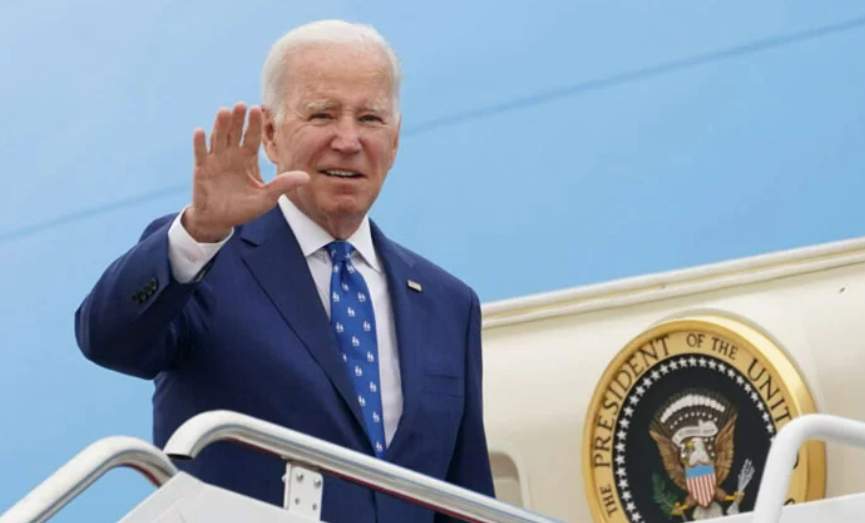Washington.– The president of the United States, Joe Biden, undertakes his first trip to Mexico on Sunday where he will meet with his Mexican counterparts, Andrés Manuel López Obrador, and Canadian, Justin Trudeau, at a summit in which the migration crisis and drug trafficking will have a special role.
And it is that the conclave takes place a few days after Biden presented a new plan that plans to return irregular migrants from Venezuela, Cuba, Nicaragua and Haiti to Mexico, and that the Mexican authorities captured the drug trafficker Ovidio Guzmán, son of Joaquín “ El Chapo» Guzmán, wanted by the United States.
Before landing in the Mexican capital, Biden will make a stop in El Paso, Texas, on his first visit as president to the border with Mexico, a region he has been avoiding for two years amid criticism from the Republican opposition.
On Monday he will be seen in Mexico City with President López Obrador and on Tuesday the Prime Minister of Canada, Justin Trudeau, will join the conversation with the celebration of the Summit of North American Leaders, known as the meeting of “The Three Amigos”. ».
This is Biden’s first trip to Latin America since he took office two years ago. The last US president to visit Mexico was Barack Obama in 2014.
On the negotiating table at the “Summit of the Three Amigos”, which last met in Washington in 2021, there is a wide variety of issues, such as immigration, drug trafficking, trade and the climate crisis.
THE IMMIGRATION PLAN, IN THE CENTER
But for the White House, the priority issue is the migration crisis at the border, which is experiencing record arrivals of migrants from the continent trying to enter the United States.
The new plan presented by Biden on Thursday and applauded by the Mexican government contemplates delivering 30,000 humanitarian permits per month for Venezuelan, Cuban, Nicaraguan and Haitian migrants who have a sponsor in the United States.
In contrast, those who cross the border without permission will be immediately returned to Mexico and banned from entering the country for five years.
According to Biden, the López Obrador government has agreed to accept the return of 30,000 people of these four nationalities every month.
White House Security Council spokesman John Kirby said at a pre-trip press conference that this is “an example of close cooperation on migration” between the United States and Mexico.
Migrants will be expelled under Title 42, a controversial health policy established by former Republican President Donald Trump (20117-2021) and which is still in force by order of the Supreme Court.
THE CAPTURE OF THE SON OF CHAPO
Another issue that worries the White House a lot is drug trafficking, especially fentanyl, a substance that is behind a good part of overdose deaths in the United States.
The drug enforcement agency of that country (DEA) seized enough fentanyl during 2022 to “kill the entire population” of the United States.
Mexico wants to show that it comes to the meeting with its homework done after having captured Ovidio Guzmán on Thursday, whom the US is asking for extradition.
Guzmán was already captured in 2019, but López Obrador was then forced to release him hours later due to the violence with which the Sinaloa cartel responded to his arrest.
“Mr. Guzmán is a key fentanyl trafficker. This is a significant triumph for the Mexican authorities and we thank them very much,” Kirby said.
In return, the Mexican government will ask Biden for more efforts to stop the trafficking of US arms to Mexico, used in the thousands of homicides that the Latin American country suffers each year.
CANADA, ECONOMY AND TRADE DISPUTES
The agenda that Canada takes to the summit has a much more economic content and includes promoting the manufacture of electric vehicles as part of the free trade agreement between the three nations (T-MEC).
However, this agreement ratified in 2021 has already left 17 commercial disputes, some of them quite high-profile.
The United States and Canada have come together to open a round of consultations to determine if Mexico’s energy policy is discriminatory against US and Canadian companies.
For their part, Mexico and Canada are waiting for an arbitration panel to rule if the United States has violated the rule that requires 75% of vehicle components to be from North America.
At the summit, some kind of agreement could also be settled on López Obrador’s attempt to ban the import of US transgenic corn for human consumption.

